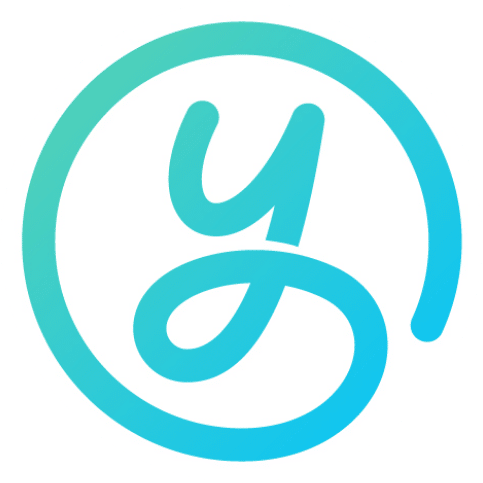If you’re applying to the University of Toronto’s Engineering program in the Faculty of Applied Science and Engineering, or you’re simply interested in learning more about the program, this guide is for you.
As a potential University of Toronto Engineering applicant, you’re probably overwhelmed by the amount of information out there.
That’s why we created this guide.
Here, we’ll break down everything you need to know about U of T Engineering, including the application (Online Student Profile and Personal Profile), deadlines, acceptance rate, program info, common questions, and much more—all in one place.
By the way, if you’re serious about getting into U of T Engineering, our 1-on-1 Youth Coaching services will help you become a stronger applicant, student, and leader. We work on things like improving real-world skills, building self-awareness, and achieving big goals, so you can maximize your post-secondary potential.
Don’t forget to check out our U of T Engineering App Prep Guide for a breakdown of the entire app, as well as Personal Profile questions, examples, and prep tips to help you stand out from the crowd.
Table of Contents
- Admissions Process: Application criteria; Admission requirements; Acceptance Rate; Admissions average; and More.
- Online Student Profile & Personal Profile: Profile overview; Personal Profile possible questions; Examples; Prep tips; and More.
- About the Program: Programs (Core 8 + EngSci); Ranking; Tuition; Scholarships; Courses; PEY Co-op/ESIP; Student life; and More.
- Common Questions About the Program: How hard is it to get in?; Is U of T good for Engineering?; What is the first year at U of T Engineering like?; and More.
Engineering U of T Application Requirements & Admissions Process
We get a ton of questions from students asking about the application process and whether or not their grades, extracurriculars, and other activities will make them a competitive applicant.
In this section, we’ll go through exactly what you need to apply, including admission requirements and averages, application deadlines, and how to apply, so you can be confident that you have everything covered.
University of Toronto Engineering – Application Criteria & How to Apply
All prospective students must complete an application through the Ontario Universities’ Application Centre (OUAC).
There are 2 different OUAC applications, so make sure you choose the one that’s right for you:
- 101 Application: For Ontario high school students.
- 105 Application: For Canadian or international students who are not currently enrolled at an Ontario high school, and want to apply to more than one university in Ontario.
The OUAC application deadline is January 15, 2026.
Once you’ve submitted that, U of T will send you an email with instructions within 7-10 days about how to set up your JOIN U of T account.
Then, you will log into the Engineering Applicant Portal to access and complete your Online Student Profile (OSP).
The OSP is a mandatory part of the U of T Engineering admissions process. The U of T Online Student Profile (OSP) is due on January 15, 2026.
However, the early consideration deadline for U of T Engineering’s Online Student Profile Deadline is December 1, 2025. This is for domestic and international students.
IMPORTANT: Submitting your application to U of T for early consideration as an OUAC 101 applicant will NOT impact the admission decision or give you a better chance of getting accepted. The only difference is that if you are accepted, you might receive an admission decision earlier than someone who applied for regular consideration. Click here to learn more information, and if you have questions, connect with a coach any time for support.
COACH’S TIP: Throughout the entire application process (from when you apply on OUAC to when you get your offer), check our Engineering Applicant Portal often. This is the main way that U of T Engineering will contact you or give you updates, so you want to make sure that you don’t miss a message from them that could put your application at risk. You can also check the status of your application through the U of T Engineering portal.
As a part of your application, you also have to choose between 2 pathways to start your journey at U of T Engineering:
- Core 8 Programs, Declared Engineering: If you know exactly what you want to study during your degree, you can apply directly to a Core 8 program. These are:
- Chemical Engineering
- Civil Engineering
- Electrical & Computer Engineering
- Industrial Engineering
- Materials Engineering
- Mechanical Engineering
- Mineral Engineering
COACH’S TIP: If you don’t know exactly which of these you want to focus on in your first year, don’t panic! Take advantage of U of T’s TrackOne program, which allows you to explore several areas listed above to help you decide which is most interesting to you. Then, at the end of the first year, you declare which Core 8 program you want to join.
- Engineering Science (EngSci): This is a direct-entry program for those who want a unique academic challenge. You’ll get a foundational, comprehensive education in Years 1-2 and then choose 1 of 8 EngSci majors for Year 3-4.
To learn more about the Core 8 and EngSci options, visit this page. If you aren’t sure which of these options is right for you, connect with a coach for support.
REMEMBER: Once you’ve completed your application and submitted the OSP, you can apply for scholarships (keep reading for a full list) and residence (with the StarRez app, which is available on the Engineering Applicant Portal).
For more information on completing your application, visit this page or connect with a coach anytime for support.
You Might Also Like
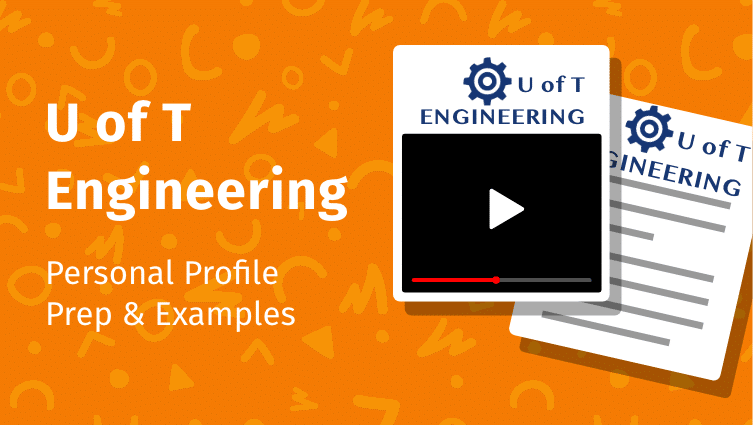
Application Prep
U of T Engineering: Personal Profile Questions Prep & Examples 2025/2026
If you are looking for guidance on the U of T Engineering Online Student Profile, including U of T Personal… Read more
University of Toronto Engineering – Admission Requirements
Here are the academic/course requirements for the U of T Engineering program for Ontario students (101 applicants):
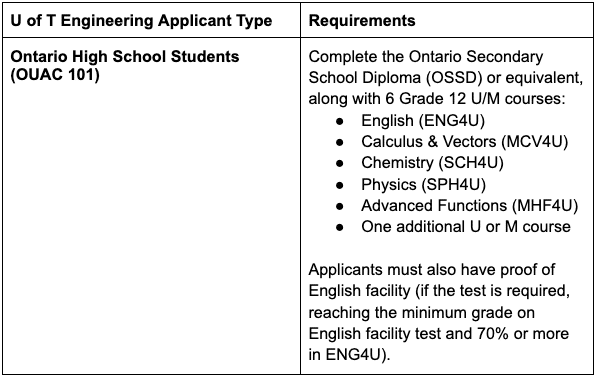
If you are not an Ontario student, check out these pages for the admission requirements:
- Non-Ontario applicants (105 applicants): Learn about the requirements specific to your province/territory here.
- Applying outside of Canada (105 applicant): Click here for the academic requirements specific to your country and education system.
You might also be wondering how the University of Toronto uses these academic requirements in their evaluation of applicants.
When you apply to U of T, your application is considered following these steps:
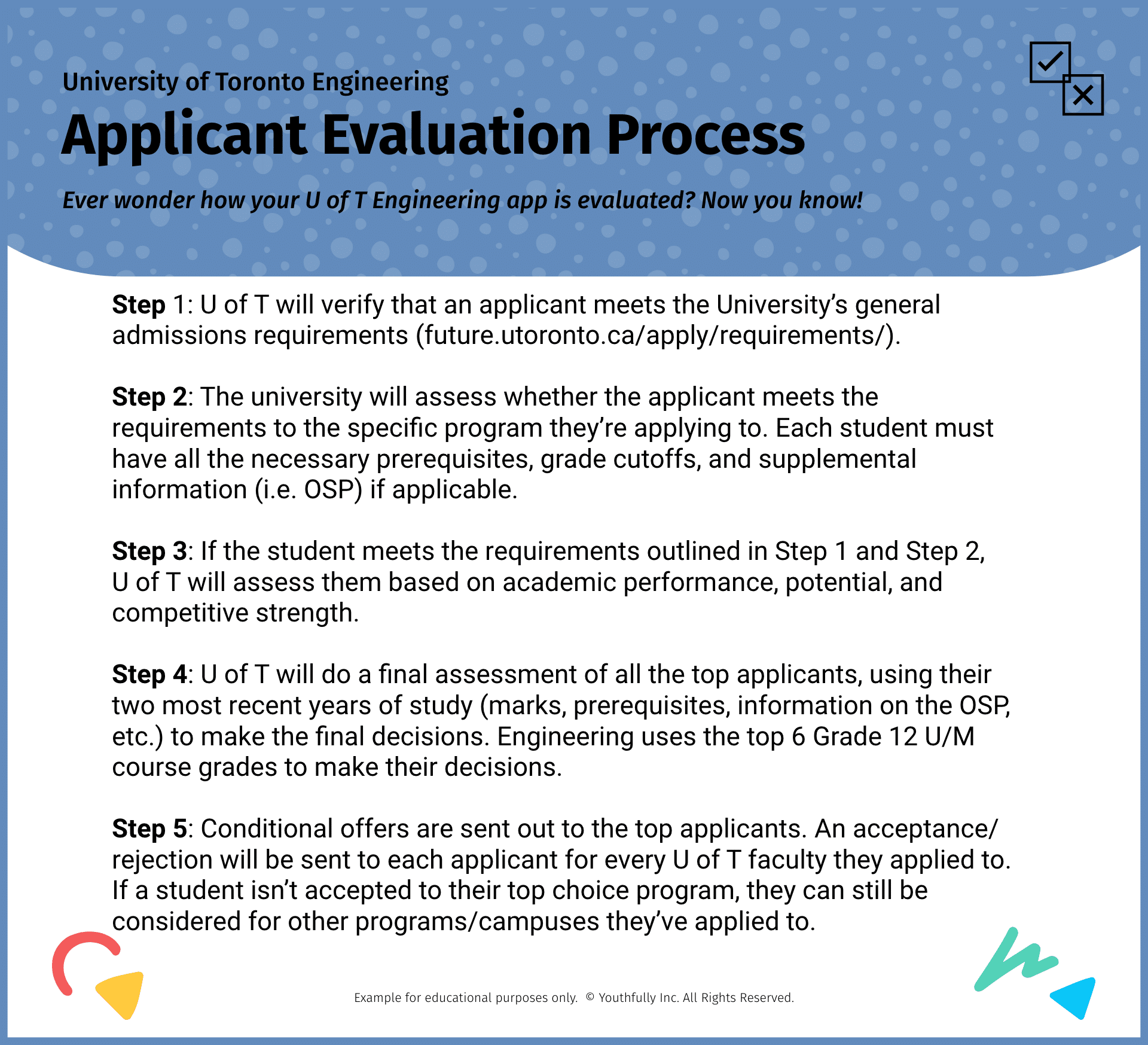
Have questions or need help? Get support now.
U of T Engineering – Admission Average
Wondering how your average compares to other applicants?
U of T Engineeringwill use your top 6 Grade 12 U/M courses, including the prerequisite courses mentioned above to determine your admission average.
On their Requirements page, U of T Engineering states that there is a minimum course average of 70% for the required courses and students who do not reach this average will not be considered.
REMEMBER: While the Faculty of Applied Science and Engineering states that 70% is the absolute cutoff, this is NOT considered a competitive average to get into U of T Engineering.
U of T Engineering states that the admission average depends on the program you plan to take during your degree:

In the Faculty of Applied Science and Engineering, the averages for incoming high school students over the last 10 years have been in the low/mid 90s.
Here are the Ontario secondary school admission averages of incoming first-year students to the U of T Engineering program since 2012:
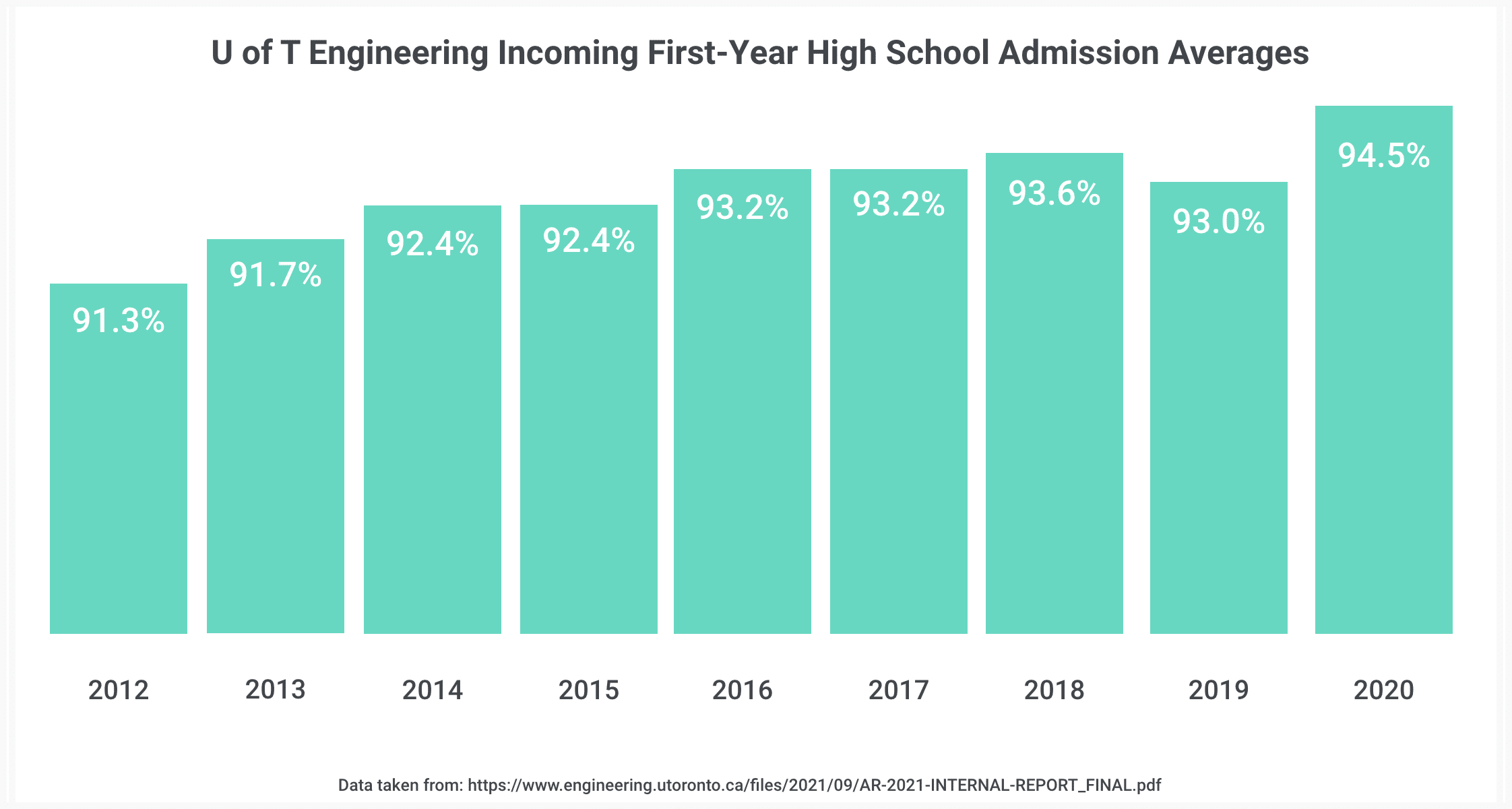
As you can see, an average of 90-95% will make you a competitive applicant, regardless of the program (EngSci, Core 8, etc.) you’re applying for.
If your marks are slightly below this average, this is where the Online Student Profile (and Personal Profile) become REALLY important.
Why? The U of T Engineering admissions committee evaluates students holistically, meaning that they look at grades, skills, extracurricular involvement, and more to get a clear sense of the whole student (keep reading to learn more about this process).
This means that if your average is a bit below the competitive range as outlined in the table above, that you still have a shot at getting in if your OSP is unique and memorable and you do a great job of communicating your skills, interests, experiences, and goals. In this way, the OSP could mean the difference between acceptance and rejection, so you want to make sure you’re prepared.
Keep reading to learn more about the Online Student Profile and Personal Profile (and read our comprehensive U of T Engineering App Prep Guide here). To learn how you can use it to make your application more competitive, connect with a coach now.
U of T Engineering – Acceptance Rate & Number of Applicants
This is probably the most common question we get: “What is the acceptance rate for U of T Engineering?”
While the exact acceptance rate is tough to calculate exactly, here are a few approximate numbers.
As a top ranked program, thousands of people apply to the Faculty of Applied Science and Engineering every year (in 2018 there was a record of 13,000+ applicants!).
Here are how many people applied over the last 10 years, along with the number of offers U of T Engineering sent and the number of people who accepted the offers:
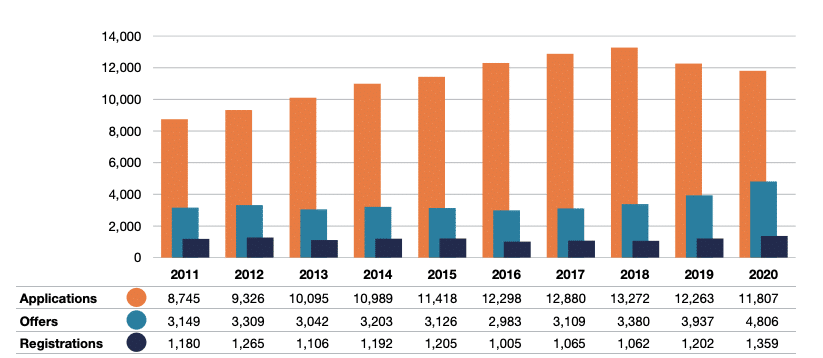
Data collected from U of T Engineering Internal Report.
Using this data, we can see that the acceptance rate for 2020 is 40.7%.
REMEMBER: U of T Engineering sends out more offers than they have space for because they know that some students will reject the offer. For example, in 2020 they gave 4,806 offers and only about 28% (1,359) students accepted that offer.
This means that a more accurate acceptance rate is 11.5%.
All these numbers can seem confusing, but just remember — if you meet all the admission requirements and you have a really strong Online Student Profile, then you have a really good chance of being accepted into the program.
If you want to make sure that you’ve set yourself up for success when it comes to U of T Engineering’s holistic applicant evaluation process, connect with a coach now.
University of Toronto Engineering – Acceptance Dates
U of T Engineering typically evaluates all applicants in the spring of every year, and then sends out their first round of offers in late February-April. If you applied for early admission, you’ll probably hear earlier than this.
As mentioned above, some people reject their offer from U of T Engineering (for example, in 2020 around 28% of people accepted their offer).
If necessary, U of T Engineering will send out some more acceptance letters to ensure that they fill the entire incoming class. These letters could arrive as late as mid/late April or May, so if you don’t hear right away, don’t panic!
If you have been accepted to the U of T Engineering program, you must accept the offer by June 1, 2026 through the OUAC portal (and congratulations!!!).
Become a stronger UofT Eng applicant.
get a youth coach™Alex
U of T Eng
Expert &
Youth Coach™

Engineering U of T Application – Online Student Profile & Personal Profile
U of T Engineering – Portal & Application Overview
As mentioned above, once you’ve submitted your OUAC application, U of T will send you an email with instructions within 7-10 days about how to set up your JOIN U of T account.
Then, you will log into the Engineering Applicant Portal to access and complete your Online Student Profile (OSP), which is a mandatory part of the U of T Engineering admissions process.
The U of T Online Student Profile has 6 sections:
- Engineering Program Selection: Rank the engineering programs you want to be considered for (you can choose up to 4 U of T Engineering programs here). Rank your choices in order of preference (i.e. with your top choice as #1, followed by #2, #3, and #4). You will receive ONE offer of admission.
- Academic Timeline: Outline your academic activity from Grade 9 to present. Most of this information can be taken directly from your OUAC application.
- Other Information: Submitting standardized test scores or detailing plans to meet English language requirements; all other fields are optional. Applicants must enter details of any AP, SAT, or ACT exams taken or planned, and have official scores sent directly using provided institution codes. An Optional Applicant Statement is available for any additional academic history or personal challenges that may impact the application. For those with significant personal, health, or accessibility concerns, the Special Consideration section allows for requests for special accommodation in the admissions process, with appropriate documentation required.
- Academic Profile: Select institutions and any secondary and post-secondary courses you have taken at those institutions.
- Extracurricular Involvement: Detail your activities outside of the classroom, like paid/unpaid employment, hobbies, clubs, sports, etc. You will indicate the type of activity and briefly describe it and start/end dates. Be as specific and concise as possible in the description and describe the key skills you’ve developed, what you’ve learned, and how it has helped you grow as a person.
- Extracurricular Essay. Write on 250-word essay related to the skills you’ve gained through those extracurriculars, and how it shaped your decision to apply to the U of T program.
- Personal Profile: Answer 3 randomly selected questions (1 written and 2 video questions). Keep reading to learn more about these questions and how to answer them in a memorable and unique way.
COACH’S TIP: Even though the U of T Engineering Personal Profile is one part of the Online Student Profile, don’t pay less attention to the other components of the OSP. Spend a good amount of time making sure you’re choosing the right activities, skills, achievements, and interests to highlight in the academic profile, extracurriculars sections, etc. If you need help, connect with a coach any time.
You will access the Personal Profile through your Online Student Profile in the U of T Engineering Portal. The entire Personal Profile is completed through a third-party site.
The Personal Profile will take about 30 minutes total to complete. It consists of 3 randomly selected questions:
- 1 written question, where you’ll have 10 minutes to prepare and give a 250-word response.
- 1 video question, where you’ll have 3 minutes to prepare and 2 minutes to answer.
- 1 video question, where you’ll have 3 minutes to prepare and 3 minutes to answer.
Keep reading for a breakdown of the Personal Profile, as well as possible written/video questions, prep tips, examples, common questions about the application, and much more.
Work with your coach, and we have access to many past questions being asked as well as a methodology to prepare the most effectively.
You Might Also Like
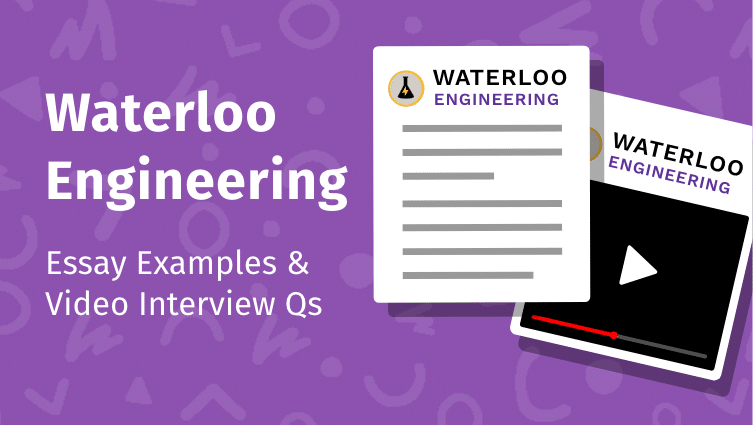
Application Prep
Waterloo Engineering Interview Questions & AIF Examples 2025/2026
If you are looking for Waterloo Engineering essay examples, video interview questions, and general guidance on the Admissions Information Form… Read more
U of T Engineering Personal Profile: Evaluation
Each U of T Engineering Online Student Profile (including the Personal Profile) is evaluated by members of the U of T community who have been carefully selected and trained.
When deciding who to accept into the program, they use a ‘Broad-Based Admissions’ approach, where they evaluate you beyond your grades, considering your achievements, skills, and extracurriculars outside of the classroom.
Your Profile gives a full snapshot of these broad-based evaluation criteria, including your academic achievements, extracurricular involvement, and the information you provide in your Personal Profile answers (more on these below).
For your written/video questions on the Personal Profile, the reviewers are looking for students who are articulate, passionate, and dedicated. They also want to see that you can work well under pressure, have the drive to succeed in the program, and can think critically to solve problems.
We know that this part of the application can be super stressful. If you need help as you prepare for the U of T Engineering Personal Profile written and video questions, connect with a coach for support. We’ll help you prep answers to possible questions, do mock interviews, and share tips that have helped hundreds of students get into their top-choice programs.
U of T Engineering Personal Profile: Questions
The U of T Engineering Personal Profile questions generally fall into these 2 question types:
- Personal Questions: Allow the interview to get to know you beyond your grades by focusing on topics like interests, goals, role models, accomplishments, teamwork, dealing with conflict, and more.
- Problem Questions: Objective questions that ask you to solve a problem using critical, logical, and creative reasoning.
Here are some possible U of T Engineering Personal Profile questions we’ve seen come up in the U of T Engineering Personal Profile interview.
REMEMBER: These questions are possible for BOTH the written and video responses.
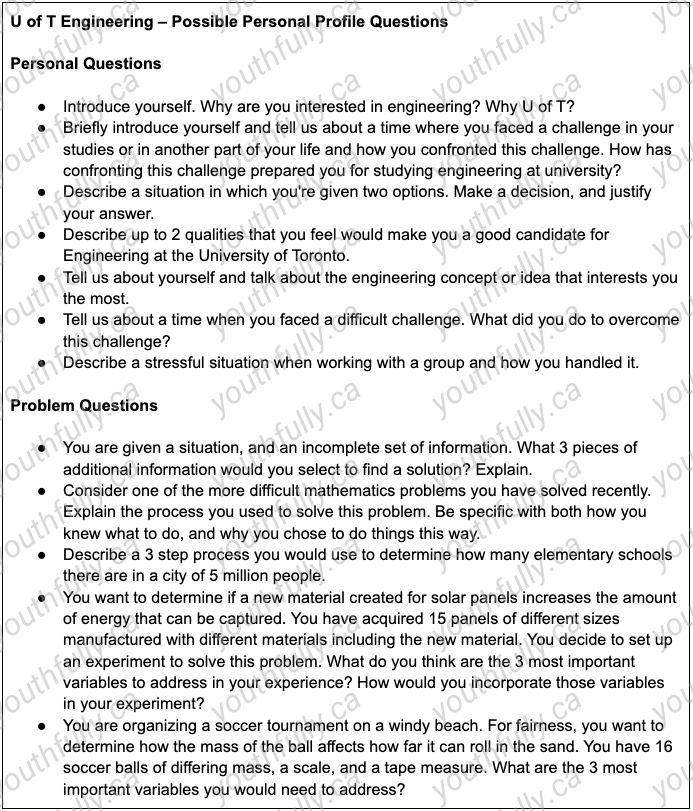
For a full breakdown of exactly how to approach Personal and Problem Questions so you can answer any question that comes your way, check out our Interview Prep Skills Guide. We’ve also got a ton of templates, examples, and prep strategies in our U of T Engineering App Prep Guide (trust us, you don’t want to miss this!).
You Might Also Like
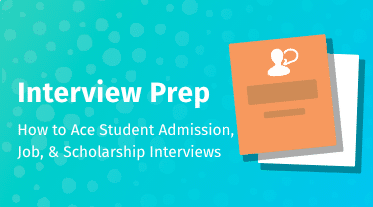
Skills Training
Interview Prep: How to Ace Student Admission, Job, and Scholarship Interviews
Even though you’ll do dozens of interviews during the course of your academic and professional career, you’ve probably had no… Read more
U of T Engineering Personal Profile: Question Examples
Here are some examples to help you as you prepare for the U of T Personal Profile written and video questions.
REMEMBER: This is an EXAMPLE ONLY and is NOT meant for you to copy. Why? First and foremost, this is plagiarism and is a serious offense. Plagiarizing these essays will result in immediate disqualification from the admissions process. This can be easily detected using technology and application reviewers are usually trained and/or able to spot when an application isn’t original and does not align with an applicant’s background, personality, values, etc.
Personal Profile Example 1:
Here’s an example of an answer to the video question:
“Who is an engineer you admire, and why? What did they do that influenced your interest in engineering, and how did you first learn about them?”
Personal Profile Example 2:
Here’s an example of an answer to the written question:
“Think of a difficult math or logic problem that comes to mind. Walk through how you approached the problem, explaining the reasoning behind each step and how you decided which methods or strategies to use.”
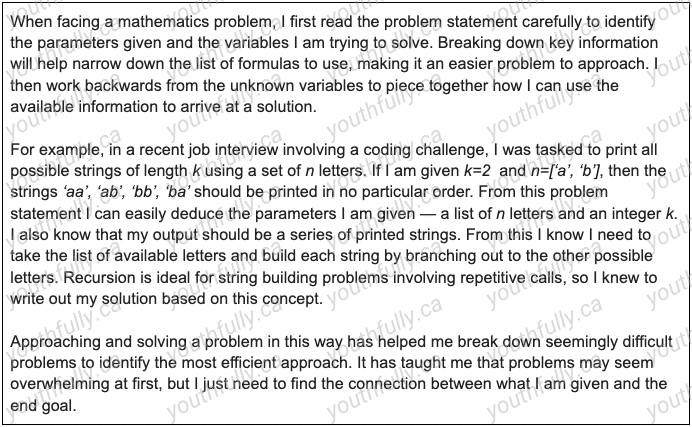
For more U of T Engineering Personal Profile written/video question examples, read our U of T Engineering App Prep Guide.
U of T Engineering Personal Profile: Prep Tips
Many students ask us for tips for preparing for the U of T Engineering Personal Profile. Here are the ones we think will help you the most:
TIP #1: PRACTICE MAKES PERFECT
It can seem really scary to see yourself talking on screen and worrying about how you are coming across to the admissions committee.
Open up your camera and practice answering some of the Possible questions listed below. Recording yourself will help you get the hang of things and get comfortable with seeing yourself on camera. Learn more about effective interview prep tips here.
If you want to take your prep to the next level, work 1-on-1 with a coach and do some mock interviews so you know exactly what to do when you’re recording your answers for real.
TIP #2: ALWAYS ANSWER THE ENTIRE QUESTION
It seems silly, but it is common to get off track and later realize you didn’t answer the question. Break down each part of the question into smaller components, and address each one as you move through your answer. If you’re working on a written question, take some time at the end while you’re proofreading to make sure you’ve answered everything.
TIP #3: TAKE YOUR TIME
Sometimes when you know you have a limited amount of time you might speed through everything like a mad race against the clock. For the video questions, remember to take a breath and pause between your sentences to allow the reviewer time to process what you said. Focus on speaking clearly and slowly.
TIP #4: SHARE IMPORTANT INFO ABOUT YOU
Remember that every answer you give should tell the interviewer something about you that boosts your application, even if the question isn’t about you. Highlight your skills and experiences, show that you have thought about goals, and use the questions to help the admissions committee learn more about you. You’re going to be a great addition to their program — tell them how!
TIP #5: BE CONCISE
Your answers should be clear and to the point, leaving out unnecessary information. In the video questions, you don’t want to ramble — get to the point and be clear, providing clear examples and specific points that fully answer the question. The written questions are the same. 150 words isn’t that much so you have to make every word count. Get rid of information that is repetitive or doesn’t add value. It is better to have a short, concise answer than a convoluted answer that is redundant and possibly unfocused.
TIP #6: BE PROFESSIONAL (BUT ALSO HAVE FUN!)
When preparing for your video questions make sure that you come across as a young professional with something special to offer the program. How can you do this?
- Dress professionally
- Make sure the background behind your camera is empty
- Go somewhere that is quiet and free from distractions
- Sit up straight
- Maintain eye contact with the camera the entire time
Learn more here about effective physical, vocal, and mental cues that will help you leave a good impression.
While it’s important to be professional, it’s also important to have fun with these questions. The admissions committee wants to admit unique people who have a shining personality and the experiences to match. Show them who you are and be yourself.
TIP #7: DIFFERENTIATE YOURSELF
The admissions committee reviews thousands of applications. You’ll never stand out if your answers are the same as everyone else’s, so come up with answers that are unique. For example, if there’s a question that asks “Describe a time when you had to adapt” don’t simply talk about how COVID made everything more difficult. Instead, you can talk about an experience where you took on a challenge and tried something that hadn’t been done before. Then, shift the question into talking about your successes and what you learned from the experience.
For other interview prep tips that can help you stand out from other applicants, check out our Interview Skills Guide, which breaks down tips for preparing, performing, and perfecting your answers. We’ve also got more prep strategies in our U of T Engineering App Prep Guide here.
If you would like more tips to help you prepare, as well as the chance to up your game and do some mock video/written questions, connect with a coach today. Our coaches have helped hundreds of students conquer their Personal Profile questions and achieve admissions success!
Ace your U of T Eng Personal Profile.
get a youth coach™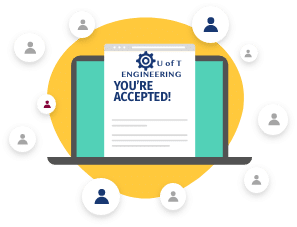
About the Engineering U of T Program
The Engineering Program at the University of Toronto’s Faculty of Applied Science and Engineering is ranked among the top universities in Canada.
Located at the St. George Campus in downtown Toronto, Ontario, this world-renowned program uses experiential learning and multidisciplinary, collaborative education to help students think beyond conventional approaches to engineering and address a vast range of social, economic, and industrial challenges, like:
- Advanced manufacturing
- Data analytics and artificial intelligence
- Human health
- Robotics
- Sustainability
- Water
In this section, we’ll go over some of the aspects of this program so you can get more information and make sure that it’s right for you. If you have any questions, connect with a coach for support.
U of T Engineering – Entry Options, Programs, & Focus Areas
As mentioned above, there are various focus areas you can pursue, depending on your unique interests and career goals.
When you apply to the U of T Engineering program, you have to choose whether you want to do the Core 8, Declared Engineering program or Engineering Science (EngSci) focus.
If you aren’t exactly sure what you want to study, you can do the TrackOne, Undeclared Engineering in your first year and decide on a focus area at the end of Year 1.
Here are the Programs/Entry Options offered at U of T Engineering, with the areas of focus/Majors below each. Students must choose one of these Programs and focus areas, and then complete the specific requirements for that program/area:
- Core 8 Programs, Declared Engineering:
- Chemical Engineering
- Biomolecular and Biomedical Engineering
- Bioprocess Engineering
- Chemical and Materials Process Engineering
- Environmental Science and Engineering
- Informatics
- Pulp and Paper
- Surface and Interface Engineering
- Sustainable Energy
- Civil Engineering
- Building Science
- Construction Management
- Environmental Engineering
- Mining & Geomechanics
- Structural Engineering
- Transportation Engineering & Planning
- Electrical & Computer Engineering
- Analog & Digital Electronics
- Communications, Signal Processing & Control
- Computer Hardware & Networks
- Electromagnetics & Energy Systems
- Photonics & Semiconductor Physics
- Software
- Industrial Engineering
- Human Factors
- Information Engineering
- Operations Research
- Artificial Intelligence & Machine Learning
- Materials Engineering
- Biomaterials
- Design of Materials
- Manufacturing with Materials
- Sustainable Materials Processing
- Mechanical Engineering
- Bioengineering
- Energy & Environment
- Manufacturing
- Mechatronics
- Solid Mechanics & Design
- Mineral Engineering
- Environmental Impact & Risk Assessment
- Mine Design
- Mineral Processing
- Mining Economics & Finance
- Surface & Underground Mining
- Wastewater Management
- Chemical Engineering
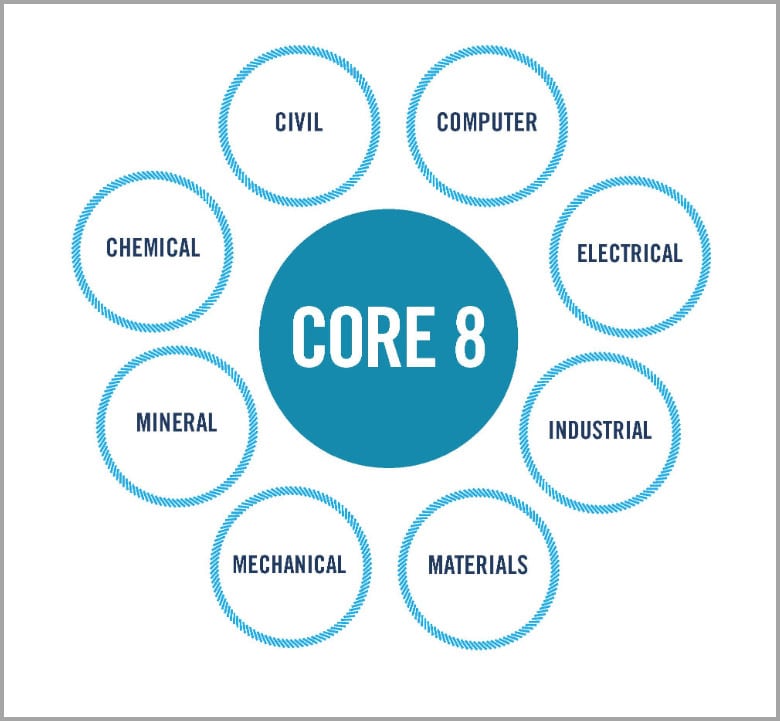
- Engineering Science (EngSci)
- Aerospace Engineering
- Biomedical Systems Engineering
- Electrical & Computer Engineering
- Energy Systems Engineering
- Engineering Mathematics, Statistics & Finance
- Engineering Physics
- Machine Intelligence
- Robotics
In Years 1-2, students doing the EngSci program will complete the same courses, building a solid and comprehensive foundation. Then in Year 3, each student will choose 1 of the 8 majors listed above and focus their studies on Years 3-4 to that area with courses and requirements specific to that Major.
U of T Engineering – Practical Experience Requirement & Co-op
All U of T Engineering students (Core Programs and EngSci) must complete the Practical Experience Requirement (PER), which is a minimum 600 hours of practical work experience.
It can be completed at any point before graduation.
The PER can come in many forms, like paid/unpaid work and internships, conducting research, or in other positions in industry, and it should be an experience that allows you to develop meaningful responsibilities, judgment, communication, and professional experience.
REMEMBER: If you plan on doing a Professional Experience Year (PEY) Co-op program or Engineering Summer Internship Program (eSIP), these will automatically satisfy the Practical Experience Requirement (keep reading to learn more about both of these).
For more information on the Practical Experience Requirement, visit this page.
U of T Engineering – PEY Co-op & ESIP
U of T’s Engineering program has two ways that students can get real-world professional experience in their industry.
REMEMBER: There are 2 registration periods for the PEY and ESIP Programs, so make sure you don’t miss these important deadlines.
U OF T ENGINEERING – PEY CO-OP
The Professional Experience Year Co-op (PEY Co-op) is the largest of its kind in Canada.
This 12-16 month paid work placement gives students the chance to gain invaluable experience in a legitimate engineering job, while earning a competitive salary. It is open to students who have completed Year 3.
REMEMBER: You must state your intention to do a PEY Co-op on your application to the U of T Engineering program when you apply as a 101/105 OUAC applicant.
As mentioned above, doing the PEY Co-op will automatically satisfy the Practical Experience Requirement (PER).
In addition to gaining experience on the job, these co-ops are so valuable because they show you what it’s really like to apply, interview, and compete for jobs at some big companies like Apple, Tesla, and Google.
To help make sure that you’re prepared for the PEY Co-op, U of T Engineering started a new program in 2020 for students in Year 1 and Year 2 to give them the training and professional experience they need to thrive in the PEY.
In Year 1, Engineering students will go through career exploration programming and then in Year 2 there are various modules students must pass to be able to apply for the PEY at the end of Year 3. All students must compete for these jobs, as well as write resumes and do job interviews.
U of T Engineering reports that 741 students did a virtual or in person PEY Co-op in 2020-2021, including 22 outside of Canada.
For more information on the PEY Co-op at U of T Engineering, visit this page.
U OF T ENGINEERING – ESIP
The Engineering Summer Internship Program (ESIP) is a four month, full time work term (May-August) counts towards the Practical Experience Requirement (PER) mentioned above.
Before 2022, this was an optional work term and was a standalone program. This is NOT the case anymore.
As of 2022, this program is now a part of the New PEY Co-op programming model, which includes the option to do a summer work term after Year 2. You will be paid for your work (on average students get about $23/hour).
The ESIP is a great opportunity for you to apply what you’ve learned in the classroom and put your technical and professional skills to use while gaining relevant experience in your field of interest.
Along with the PEY Co-op, both opportunities will show you what it’s really like to apply for jobs, do interviews, and showcase your skills to prospective employers. We know this process can be really scary and overwhelming, so we’ve developed a comprehensive Interview Prep Guide to help you ace all your interviews. Our Youth Coaches™ have also helped hundreds of students land invaluable co-ops, internships, and summer programs and can help you stand out from other applicants. Learn more here.
To learn more about the ESIP at U of T Engineering, visit this page.
You Might Also Like
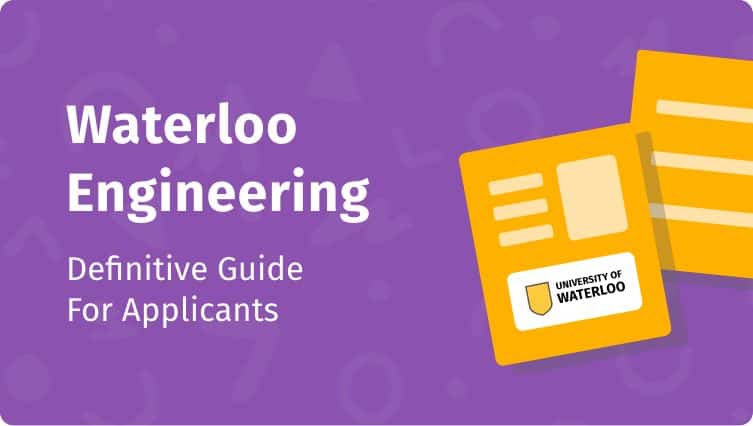
Program Guide
Waterloo Engineering: The Definitive Guide for Applicants (2026)
Whether you’re applying to Waterloo Engineering or simply interested in learning about the program, this guide is for you. As… Read more
U of T Engineering – Courses
Core 8 Programs
Each of the Core 8 Programs (Chemical Engineering, Civil Engineering, Electrical & Computer Engineering, Industrial Engineering, Materials Engineering, Mechanical Engineering, and Mineral Engineering) have their own required and elective courses.
For a complete list of courses for each Core 8 Program, as well as course descriptions, prerequisites, and exclusions, go to this page and select your program and subject area.
Engineering Science (EngSci)
YEAR 1
Here are the Foundation Year Courses you can expect to take in your first year as an EngSci student:
Fall Term:
- Classical Mechanics
- Praxis I
- Structures & Materials
- Engineering Mathematics & Computation
- Computer Programming
- Calculus I
Winter Term:
- Praxis II
- Molecules & Materials
- Calculus II
- Linear Algebra
- Fundamentals of Electric Circuits
- Computer Algorithms & Data Structures
YEAR 2
Here are some of the courses you can expect in Year 2:
Fall Term:
- AER210H1: Vector Calculus & Fluid Mechanics
- CHE260H1: Thermodynamics and Heat Transfer
- ECE253H1: Digital and Computer Systems
- ESC203H1: Engineering and Society
- MAT292H1: Ordinary Differential Equations
- PHY293H1: Waves and Modern Physics
Winter Term:
- BME205H1: Fundamentals of Biomedical Engineering
- ECE259H1: Electromagnetism
- ECE286H1: Probability and Statistics
- ESC204H1: Praxis III
- PHY294H1: Quantum and Thermal Physics
- Complementary Studies Elective
YEARS 3-4
In Years 3 and 4, courses will depend on which Major you choose, as well as if you opted to do the PEY Co-op. View the full course calendar and courses for each Major here.
For a complete list of the Engineering Science courses, as well as the required courses for all 8 EngSci Majors, visit this page.
U of T Engineering – Ranking
U of T Engineering is known as Canada’s #1 Engineering school, and is ranked #26 globally by Times Higher Education (THE) World University Rankings. U of T Engineering is Canada’s oldest and largest engineering school.
Why? U of T Engineering is one of the few programs to offer Engineering Science (EngSci), as well as a broad range of programs and research areas. It’s renowned for its robotics program, being the largest and diverse in Canada, as well as being a leader in health care engineering. The Faculty is also leading the way in their sustainability programs and research, creating alternative technologies to address climate change and the water crisis.
U of T Engineering – Tuition
In 2020, tuition for the Bachelor of Applied Science, Engineering program was $14,180 (domestic students) and $57,020 (international students).
This DOES NOT include other fees such as incidental fees, residence + meal plan, books, supplies, transportation, etc.
Here’s a general breakdown of the tuition and other fees you can expect to pay as a U of T Engineering Student:
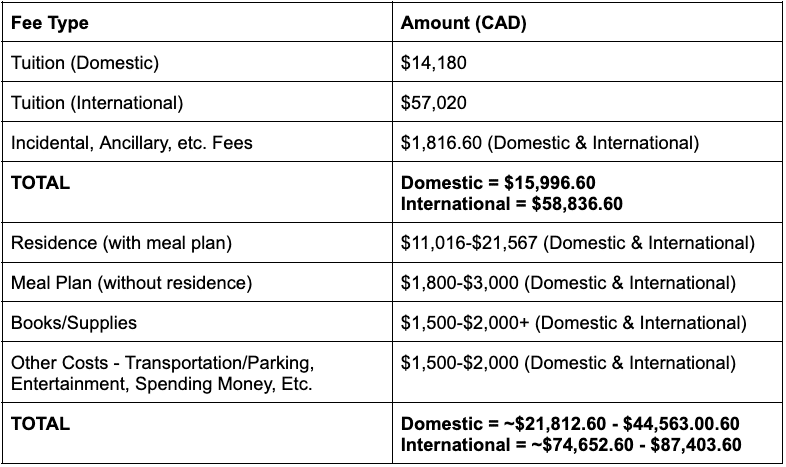
U of T Engineering – Scholarships and Awards
Even though the tuition and fees listed above might seem overwhelming, the University of Toronto has over 4,400 admission scholarships and 5,900 in-course scholarships that you can win to help with these high costs.
Check out U of T’s Award Explorer to see which scholarships and awards you can apply for.
When you submit your OUAC application, you will automatically be considered for a number of scholarships and awards.
The Faculty of Applied Science and Engineering also has many scholarships you can apply to separately (from your OUAC application), each with a fixed deadline, such as:
- AIST Foundation Steel to Students Program: Covers the full cost of registration and up to US$600 in travel reimbursement (per conference) for post-secondary vocational/technical school students, undergraduate and graduate-level students to attend AIST’s Technology Training Conferences and AIST Member Chapter annual meetings that include a technical program. Students may apply to attend multiple conferences of different topics.
- AIST Member Chapter Scholarships: AIST’s 21 Local Member Chapters account for more than 43 scholarships issued on an annual basis to qualified individuals within their local regions. Students can receive tuition funding from their local member chapter. Students qualify for funding through the Northern and Globe-Trotter Member Chapters. Scholarship amounts and deadlines vary.
- NSERC Indigenous Student Ambassadors: The NSERC Indigenous Student Ambassadors (NISA) grant aims to engage Indigenous students and fellows in promoting interest and participation in the natural sciences and engineering (NSE) by visiting Canada’s Indigenous communities and schools and sharing their research and education experiences or participating in science promotion events and activities. The grant will cover costs associated with the proposed NSE promotion activity and Indigenous community or school visit. Value: up to $5,000.
- NSERC Student Ambassadors: The purpose of the NSERC Student Ambassadors grant is to encourage post-secondary students and fellows to share their science and engineering experience with youth from groups that are under-represented in STEM. The grant will cover costs associated with the proposed science and engineering promotion outreach activity. Value: $1,000.
There are also scholarships you can apply to due January – December of each year. There are dozens of these scholarships, so you definitely want to have them all on your radar. For a complete list of Scholarships & Opportunities in Engineering, visit this page.
U of T Engineering also has a handy tool called the Online Engineering Portfolio (ePortfolio) where you can keep track of your extracurricular activities and store your resume, so that everything is easily accessible when you want to apply for a scholarship.
Did you know that we’ve helped our students win more than $5 million in scholarships?! Connect with a coach to get the full list of scholarships for U of T Engineering and learn how you can get some of this cash for yourself. 🙂
You Might Also Like
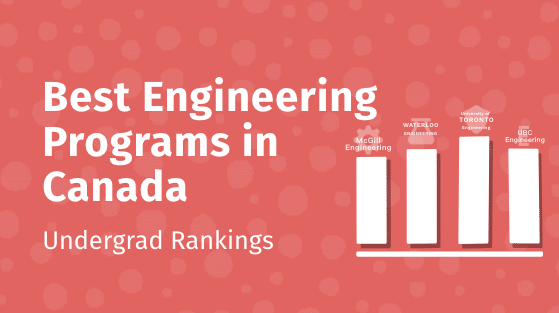
Rankings & Lists
Best Engineering Schools in Canada 2025/2026 (Undergraduate Programs)
Want to learn what the best universities in Canada for Engineering are? You’ve come to the right place. We know… Read more
U of T Engineering – Clubs & Student Life
The student life is definitely one of the most unique things that makes the University of Toronto Engineering program stand out from other universities.
The focus is on a balanced lifestyle, which is especially important for your overall mental health and wellbeing. You will need a break from your hectic coursework, and there are many opportunities for you to get involved, meet new people, and develop your passion for engineering.
For over 150 years, U of T Engineering has created a sense of community that is diverse as its faculty and students. There are many traditions that are upheld by the University of Toronto Engineering Society (aka Skule™ or EngSoc). EngSoc has over 4,500 members and provides services, funding, and extracurricular opportunities, and it oversees many of the engineering clubs and teams. As an undergrad Engineering student, you’re automatically part of EngSoc.
With over 75 student clubs and teams to explore, there’s everything from athletics, fine arts, and musical clubs, to professional development, community, and sustainability clubs (see the full list of clubs here). There are also Design Teams and discipline-specific clubs that might be of interest. The takeaway here is that there really is something for everyone, no matter what you’re interested in, and this is a great place to meet lifelong friends.
Another thing that makes student life at U of T Engineering so special is that you’ll be living in the heart of downtown Toronto. There is ALWAYS something to do in this bustling city and you’ll never get tired of exploring, going to concerts, sporting events, festivals, and more. A lot of university campuses can seem really closed off from the rest of the city, but U of T is right in the middle of Toronto, taking up 180 acres covering several city blocks. We guarantee that you’ll love calling Toronto home for 4 years.
U of T Engineering – International Exchange
The Faculty of Applied Science and Engineering has many options for students to continue their studies while experiencing new cultures, ways of life, and learning more about the world.
There are more than 100 internationally renowned universities around the world, including 14 engineering-specific institutions.
To learn more about the international exchange opportunities at U of T Engineering, visit this page.
U of T Engineering – Contacts
The Faculty and Staff at U of T Engineering are always there to help whenever you need it.
Here’s the contact information if you need to get in touch with someone:
Address:35 St. George Street, Room 173, Toronto, Ontario, Canada M5S 1A4
Telephone: 416-978-3872
Email: engineering@utoronto.ca
Website: discover.engineering.utoronto.ca
U of T Engineering – Graduate Studies
U of T’s Faculty of Applied Science and Engineering offers various graduate study options to students who wish to continue their education after they complete the undergraduate program.
There are more than 2,5000 graduate students in this Faculty. Here are the graduate study options you can choose from:
- Research (MASc, PhD) Degrees:
- Master of Applied Science (MASc): A full-time, 2 year program, where each student must complete a thesis supervised by a professor in one of seven academic units. The MASc is a stepping stone to the PhD, and is ideal for students who are pursuing a career in research (in academia or industry). Students have the option to fast track to the PhD program in their second year.
- Doctor of Philosophy (PhD): Working with world-renowned researchers, you’ll gain incredible depth and experience in your field while gaining the knowledge and competencies needed for a career in research or industry leadership. All PhD students must complete a thesis of original work, supervised by a professor.
- Professional Degrees:
- Master of Engineering (MEng): This degree is meant to accelerate your career with a mix of technical, leadership, and business training. This can be completed in 1 year, full-time study or part-time through online, weekend, and evening course offerings.
- Master of Health Science (MHSc): A 2-year program, hybrid between a research intensive and professional degree. Partnered with the Institute of Biomaterials & Biomedical Engineering, this program focuses on the application and implementation of medical technology to optimize health-care delivery.
Note that each of these degrees has various additional specialties and technical emphases that students can focus on, depending on their particular research/industry interests and goals.
For more information on U of T Engineering’s graduate programs, visit this page and learn how to apply here.
Find the mentor you’ve been looking for.
get a youth coach™Joel
UofT Eng
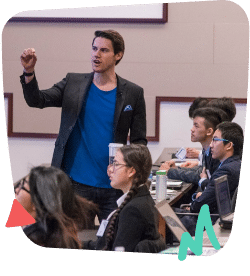
Common Questions about the U of T Engineering Program
Here are some answers to the most frequently asked questions we receive from students about the U of T Engineering program.
Don’t see your question? Check out our U of T Engineering App Prep guide for some more FAQs.
How hard is it to get into Engineering at U of T?
The Engineering program at U of T is pretty tough to get into for a few reasons. First, there is a really high cutoff average, which we discussed above.
There are also thousands of applicants every year, and the majority of them have really high averages in the mid/high 90s. For example, in 2020, incoming students had a 94.5% average (and 93% in 2019). This can make the competition even tougher.
The good news is that the U of T St. George Campus is huge, and the Faculty of Applied Science and Engineering accepts a few thousand people every year (more on this above). For example, in 2020, U of T Engineering got 11,807 applications, sent offers to 4,806 people, and had 1,359 people accept and register into the program. Based on these numbers, the acceptance rate is pretty good (at around 11%) which also increases your chances of getting in.
U of T Engineering also says that they evaluate students holistically, looking beyond grades at experiences, extracurricular activities, goals, skills, and more. This can help you a lot (especially if you’re applying to other schools like McGill Engineering which is purely grade-based). This means that you have to have a really strong academic and EC profile when applying to U of T Engineering in addition to an extremely high average then you definitely have a better chance of getting in.
Remember though that it isn’t enough just to list off a bunch of ECs you have. You have to be able to communicate all your skills, goals, achievements, and experiences in a unique and memorable way on your Online Student Profile (OSP) and written/video Personal Profile Questions. With such a strong applicant pool, having a standout Profile can mean the difference between acceptance and rejection (learn how to make yours stand out here).
We know that applying to university can be stressful, especially when you’re competing against so many strong applicants. Our Youth Coaches™ (many are U of T Engineering alumni) use a full-student coaching process to help you improve your chances of getting accepted and achieving your goals. Connect with us to get started. 🙂
Is U of T good for Engineering?
The Faculty of Applied Science & Engineering at the University of Toronto is one of the top engineering schools in Canada and is recognized globally as a leading engineering school (ranked 26 by Times Higher Education World University Rankings 2022).
U of T Engineering gets such a high ranking because of its world-renowned professors and the research and innovations of the various departments, divisions, and institutes within the Faculty of Applied Science and Engineering. With one of the most diverse communities (with over a quarter coming from outside of Canada), there’s an emphasis on inclusivity and collaborative learning.
The curriculum at U of T Engineering stands out because it incorporates technical training along with extracurricular and professional experience opportunities (e.g. the PEY Co-op and ESIP, study abroad program, research opportunities, etc.) where students can apply what they’ve learned in the classroom and can build real-world skills that will help them succeed when they graduate.
With a focus on innovation and collaboration, as well using new technology and exploring broader global perspectives, students are taught to think beyond conventional approaches to engineering to address various social, economic, and industrial challenges.
As a result, many graduates excel as global leaders and innovators in various fields, industries, and professional settings.
If you are thinking about applying for engineering, the University of Toronto is definitely a great choice.
What is U of T Engineering known for?
U of T Engineering is Canada’s oldest and largest engineering school, and is ranked as Canada’s #1 Engineering school, and is ranked as a top-ranked program globally as well.
U of T Engineering is one of the few programs to offer Engineering Science (EngSci), and U of T is one of the few universities to integrate enriched science fundamentals with engineering.
It is known for its broad range of programs and research areas (Chemical Engineering, Civil Engineering, Electrical & Computer Engineering, Industrial Engineering, Materials Engineering, Mechanical Engineering, and Mineral Engineering), making it a great choice for all types of interests, skills, and research areas.
This program is especially known for its robotics program, being the largest and diverse in Canada, as well as being a leader in health care engineering. They are leading the way in their sustainability programs and research, creating alternative technologies to address climate change and the water crisis.
What’s it like to be a student at U of T Engineering?
Being a student at U of T Engineering is truly a one-of-a-kind experience.
Being an undergraduate is so much more than just what you learn in the classroom. U of T Engineering focuses on creating opportunities for students to meet new people, try new things, and discover who they are.
With over 75 student clubs and teams to explore, you can interact with people who have the same passion for engineering as you do and make life-long relationships. There’s really something for everyone, like the Engineering Society (aka EngSoc or SkuleTM), Blue Sky Solar Racing Team, or discipline specific clubs like Indy Club.
U of T Engineering is also known for its collaborative and inclusive environment, with over a quarter of the community coming from outside of Canada (and 32% of incoming first year students are international students). Trust us, it makes a huge difference when you feel like you’re accepted and part of a community, and you will definitely feel that at U of T Engineering.
U of T Engineering is also in the heart of downtown Toronto, which makes student life even more fun. When you need a break from studying, there are a ton of concerts, sporting events, museums, festivals, and more to check out (often free or discounted prices for students). There’s always something new to explore and every area of the city will make you feel curious and engaged, no matter what part of the world you’re from. Trying new things and having the freedom to explore is great for your mental and physical health, especially when you’re in such a demanding program.
What grades do you need to get into U of T Engineering?
A competitive admission average for U of T Engineering depends on which program you’re applying to:

In the Faculty of Applied Science and Engineering, the averages for incoming high school students over the last 10 years have been in the low/mid 90s (for example, in 2020 the average of incoming high school students was 94.5%, see past years above).
U of T Engineering finds your average using your grades from these Grade 11/12 6 prerequisite U/M courses (learn more about admission requirements above):
- English (ENG4U)
- Calculus & Vectors (MCV4U)
- Chemistry (SCH4U)
- Physics (SPH4U)
- Advanced Functions (MHF4U)
- One additional U or M course
If your average doesn’t meet these averages exactly, don’t stress! U of T Engineering evaluates students holistically, looking at your extracurricular activities, experiences, interests, goals, skills, etc. as outlined on your Online Student Profile (and written/video Personal Profile questions). If you want to make your application more competitive, check out our U of T Engineering App Prep Guide and connect with a coach now.
What is first year like at U of T Engineering?
Your first year at U of T Engineering will be really busy and challenging, but also really fun!
In each semester (Fall Term is September to December and Winter Term is January to April), you will take 5 or 6 courses (see the full list here), and you will spend about 30 hours per week in class, tutorials, and labs.
Outside of the classroom, you can expect to spend 2-3 hours per night studying, and around 10+ hours on the weekend. This is more time than a regular full-time job, so try not to take on too many other commitments outside of school at first just so you can adjust. You’ll also have 2 exam periods in December and April of your first year (and every year going forward). This can be an especially busy time where you’ll spend more time studying.
The change from high school is probably one of the hardest adjustments you will have to make in your first year. In university, you might feel overwhelmed by the coursework at first and feel like you don’t have time for classes, study time, homework/readings, etc. You’ll probably also see a drop in your marks as well. Just remember — this is TOTALLY normal.
High school really doesn’t prepare you for university, so it’s natural to feel like it’s all too much. Just focus on one thing at a time, and do your best and we promise you’ll get the hang of it (we’re also here to help you along the way if you need it).
U of T Engineering also has a First Year Support Team, as well as some really helpful summer prep programs that run from June to July before your first year, where you can brush up on your math and science knowledge and learn about study skills, time management, and more.
We also highly recommend that you take advantage of Orientation in September and go to a meeting with whichever of U of T Engineering’s 75+ clubs and teams interests you the most. This will allow you to meet other students who are going through the same thing as you and give you the support you need to get through your first year.
Click here for more guidance on getting through your first year.
You’ve Got a Dedicated Coach in Your Corner
For over a decade, we have worked with thousands of students to help them achieve more than they ever thought possible.
Our coaches have a strong success rate supporting students as they apply to U of T Engineering, among other top university programs.
Our 1-on-1 Youth Coaching fills that gap that most high schools miss. We can help you build self-awareness through probing questions and assessments, set bigger goals to elevate your extracurriculars and future career plans, and improve skills that matter on supplementary applications, such as interviewing, written communication, critical thinking, and creativity.
We use a coaching methodology, called ‘full student’ development, that’s been proven to increase your chances of admission to top-tier universities and obtaining competitive jobs/internships.
So, what are you waiting for? Fulfill your post-secondary potential with the mentorship and coaching you’ve always wanted! 🙂
IMPORTANT: Want to share information and/or images from this resource on your own website, blog, article, etc.? Please ensure you reference content of any kind published by Youthfully Inc., in whole or in part, using the following statement: (1) Our Organization (Youthfully Inc.); (2) The title of our content/resource; and (3) the URL to our webpage where the content was originally posted. For example: “Sourced from: Youthfully Inc., U of T Engineering: The Definitive Guide for Applicants (2024)”, https://youthfully.com/u-of-t-engineering-definitive-guide.” Not doing so is an infringement of copyright and is illegal. We spend significant time developing resources for students, so please take a few seconds to ensure they are referenced properly.
DISCLAIMER: While the information in this blog is considered to be true and correct at the date of publication, and although our team makes every attempt to ensure that the information is accurate and vetted by university staff, Youthfully is not in any way liable for the accuracy of any information printed and stored or in any way interpreted and used by a user.
Application & Personal Profile
About the Program
Common Questions
Get 1-on-1 Support

